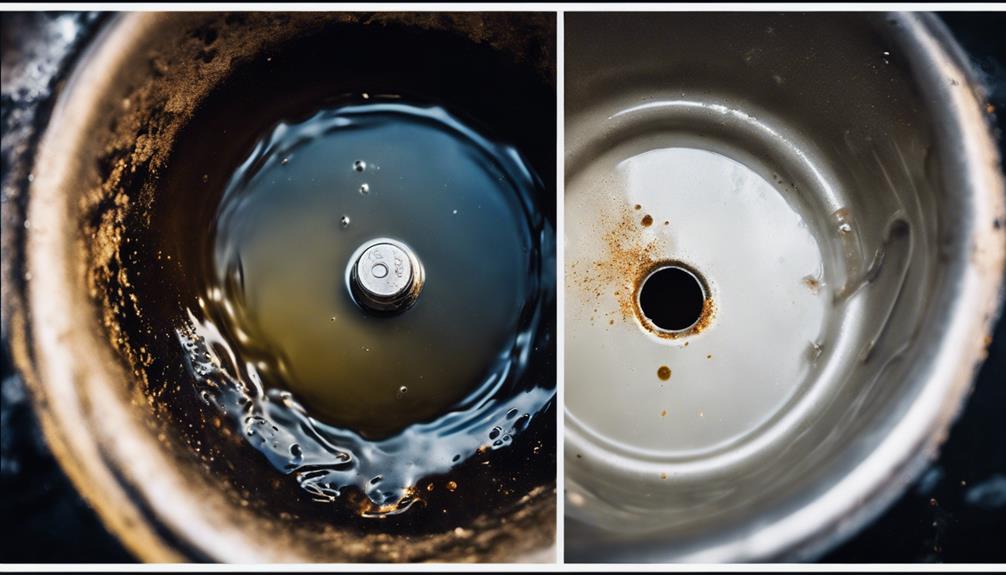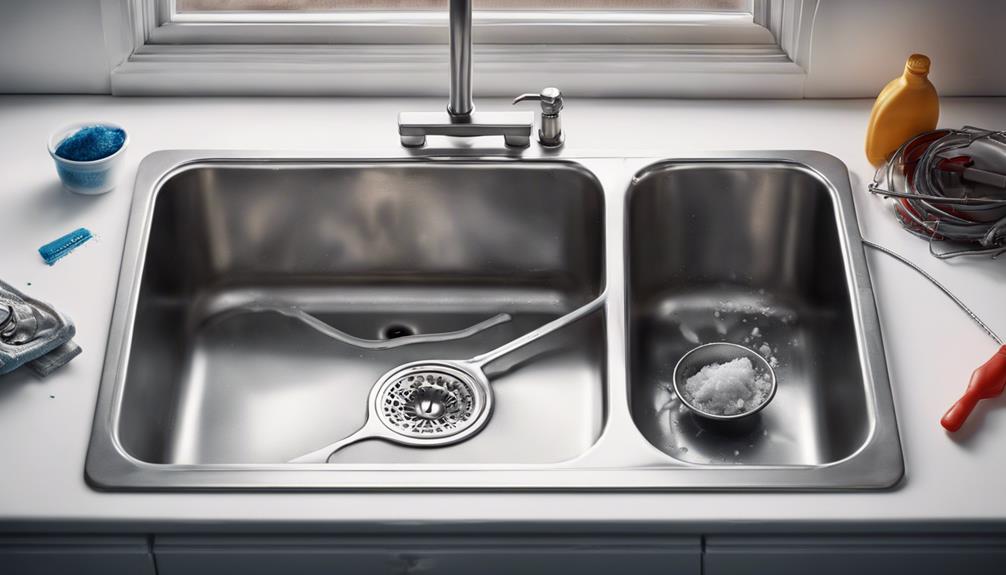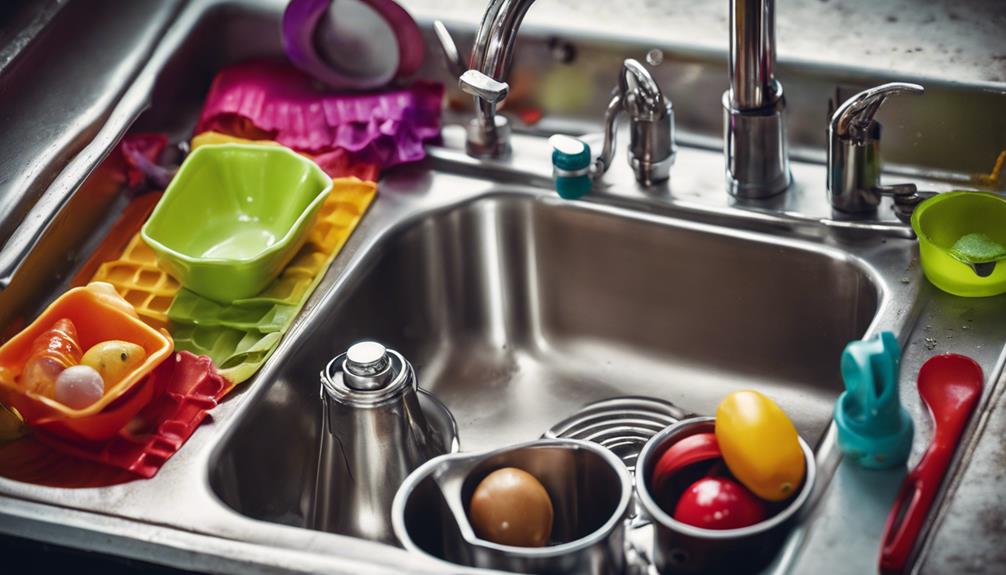You can prevent kitchen drain clogs by disposing of grease properly, running hot water through pipes to flush out grease, and regularly cleaning drain screens to catch grease and food particles. Install a mesh strainer to catch food scraps before washing dishes and maintain a consistent hot water flow rate for efficient draining. Additionally, use natural enzyme-based cleaners to break down organic matter and pour hot water down the drain regularly to dissolve grease. By following these simple tips, you'll be well on your way to clog-free drains – and there's even more you can do to keep your drains flowing smoothly!
Preventing Grease Buildup in Drains
When cooking, it's important to dispose of grease properly to prevent it from building up in your drains. Grease buildup in your kitchen sink can lead to clogs, which can be costly to repair. To prevent this, don't pour grease down the drain! Instead, use a separate container to dispose of it. This simple habit can save you from the hassle of dealing with clogs.
Hot water can also be your friend in preventing grease buildup. By running hot water through your pipes, you can flush out any remaining grease that might be lingering.
Additionally, make it a habit to regularly clean your drain screens. These screens can catch grease and prevent it from entering your drains in the first place. By taking these simple steps, you can prevent grease buildup and keep your kitchen sink flowing smoothly.
Catching Food Particles With Strainers
As you take steps to avoid kitchen drain clogs, it's important to catch food particles before they cause trouble. By implementing simple habits, you'll greatly reduce the risk of clogs and costly repairs.
Now, let's explore the key strategies for making strainers an important part of your kitchen routine.
Strain Before Washing
By installing a mesh strainer in your kitchen sink, you can effectively catch food particles before they go down the drain and cause clogs. This simple step can go a long way in preventing kitchen sink drain clogs.
By straining food scraps before washing dishes, you can stop food particles from accumulating in your pipes.
Here are some key benefits of using a drain strainer:
- Traps larger food particles, preventing them from entering your pipes
- Allows you to dispose of food debris easily, keeping your kitchen sink drain clear
- Helps prevent clogs, saving you time and money on potential repairs
Stop Grease Buildup
You've already taken the first step in preventing kitchen drain clogs by straining food particles before washing dishes, but now it's time to tackle another common culprit: grease buildup. Grease is a sneaky culprit that can quietly clog your kitchen sink, causing a mess and a headache.
To prevent buildup, make it a habit to never pour grease or oil down the drain. Instead, let it cool and solidify, then dispose of it in the trash. This simple step can save you from dealing with stubborn clogs and a clogged kitchen sink.
Remember, your strainer is your best friend in the fight against clogs. By catching food debris, coffee grounds, and other particles, you're preventing them from flowing down the drain and causing chaos.
Clean Strainers Regularly
To maintain a clog-free kitchen sink, regularly cleaning your strainer is essential, since accumulated food particles can quickly turn into a major headache. You can't afford to neglect this simple task, as it's important in preventing a clogged kitchen drain. By cleaning your strainer regularly, you'll make sure that food waste doesn't build up and cause blockages in your pipes.
Here are some tips to keep in mind:
- Empty your strainer after each use and rinse it thoroughly to maintain proper drainage in your kitchen sink.
- Invest in a high-quality strainer to help prolong the life of your pipes and prevent costly plumbing repairs.
- Make it a habit to clean your strainer at least once a week to ensure top performance and prevent clogs.
Hot Water Maintenance for Drains

Now that you're catching food particles with strainers, it's time to focus on hot water maintenance for your drains.
You'll want to ponder the flow rate of hot water, how often you use it, and whether you can make it a daily routine to keep your drains flowing freely.
Hot Water Flow Rate
Maintaining a consistent hot water flow rate is essential for efficient kitchen sink draining and preventing clogs. You want to make sure that your hot water flow rate is ideal to prevent debris buildup and keep your kitchen drains flowing smoothly.
Here are some key points to keep in mind:
- A consistent hot water flow rate helps prevent clogs in kitchen drains by dislodging debris and breaking down grease and oil buildup.
- A slow hot water flow rate may indicate a clog that needs attention to prevent further issues.
- Maintaining a consistent hot water flow rate is vital for the efficiency of your kitchen drains.
Hot Water Frequency Use
You can take a proactive approach to kitchen drain maintenance by running hot water down the drain regularly, which helps prevent grease and oil buildup. This simple habit can make a significant difference in maintaining a clog-free kitchen sink.
By doing so, you're allowing hot water to dissolve food particles and prevent them from sticking to pipe walls, ensuring smooth drainage.
Moreover, hot water can break down soap scum, which is a common culprit behind clogged drains. Regularly flushing hot water down the drain also helps prevent foul odors and bacteria growth, keeping your kitchen sink smelling fresh and clean.
Daily Hot Water Routine
By incorporating a daily hot water routine into your kitchen cleaning schedule, you can greatly reduce the risk of grease and oil buildup in your drains. This simple habit can make a big difference in maintaining your pipes and avoiding costly repairs.
Here are just a few benefits of making hot water a part of your daily routine:
- Prevent grease buildup: Hot water helps to melt and wash away fats that can cause clogs in your pipes, keeping your drains flowing smoothly.
- Break down soap scum: Hot water can break down and wash away soap scum and other residues that accumulate in your pipes, reducing the risk of blockages.
- Avoid harsh chemicals: Consistent hot water usage can help prevent the need for harsh chemical drain cleaners, which can damage your pipes over time.
Natural Enzyme-Based Drain Cleaners
Turn to natural enzyme-based drain cleaners, a safe and effective solution that harnesses the power of beneficial bacteria to break down organic matter in your drains. These cleaners are a game-changer, offering a non-toxic and eco-friendly way to maintain your kitchen drains.
By using natural enzyme-based drain cleaners, you'll prevent clogs from forming in the first place. The beneficial bacteria in these products break down grease, food particles, and other debris that can cause blockages. This means you'll avoid the hassle and expense of dealing with clogged drains.
Plus, enzyme-based cleaners are effective in maintaining clean and odor-free drains without harsh chemicals. As you incorporate natural enzyme-based drain cleaners into your routine, you'll enjoy smooth drainage and a reduced risk of clogs.
With regular use, you'll be able to rest easy knowing your drains are flowing freely and efficiently.
Regular Drain Maintenance Tips

To keep your kitchen drains flowing freely, incorporate simple maintenance habits into your routine to prevent clogs and blockages. By doing so, you'll avoid costly plumbing repairs and reduce the risk of water damage.
Here are some essential tips to prevent clogged drains:
- Use a drain strainer to catch food debris and prevent clogs
- Regularly pour hot water down the drain to dissolve grease and prevent buildup
- Avoid pouring cooking oils and fats down the drain to prevent blockages
Avoiding Common Drain Clog Culprits
When you're cooking up a storm in the kitchen, it's easy to let food scraps, coffee grounds, and grease slide down the drain, but these common culprits can quickly clog your pipes and cause major headaches.
To prevent kitchen drain clogs, avoid dumping these items down the sink. Instead, dispose of them in the trash or compost. You can also take preventative measures by running hot water down the drain after each use to keep the pipes clear. Additionally, using a drain strainer can catch debris and prevent blockages in the kitchen sink drain.
By taking these simple steps, you can keep your kitchen drain flowing smoothly and avoid plumbing problems. Remember, a clogged drain can be a major hassle, but by being mindful of what you put down the drain, you can prevent kitchen clogs and keep your kitchen running smoothly.
Try pouring a cup of vinegar down the drain occasionally to help dissolve any buildup and keep your drain clear.
Keeping Drains Flowing Smoothly

By taking proactive steps to maintain your kitchen drains, you can guarantee they keep flowing smoothly and efficiently. A clogged drain can be a real nuisance, but with regular maintenance, you can avoid kitchen clogs and keep your sink draining freely.
Here are some simple tips to keep your drains flowing smoothly:
- Run hot water down the drain once a week to help dissolve and wash away any buildup.
- Perform a deep clean on a monthly basis by pouring 1 cup of white vinegar down the drain, letting it sit for an hour, and then rinsing with hot water.
- Consider using natural enzymes or vinegar and baking soda to maintain clean drains and avoid the need for harsh chemicals.
Conclusion
As you wrap up meal prep, remember that a smooth-flowing drain is just a few simple habits away.
By preventing grease buildup, catching food scraps, and using natural cleaners, you'll dodge clogs and messy headaches.
Your drain will hum like a well-oiled machine, and you'll be the master chef of kitchen maintenance.
With these tips, your kitchen will be the culinary kingdom where meals flow as smoothly as a perfectly baked soufflé!